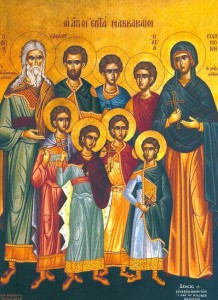 Fourth Maccabees is a philosophical treatise intended to show how reason can overcome pain and adversity (chs. 1–3). By enduring through adversities––as in the case of the martyrs in 4 Maccabees––God rewards such an individual with apotheosis. It is in this light that the author of 4 Maccabees tells the story of the martyrdom of Eleazar, the priest, and the mother and her seven sons. Throughout the tortures and coaxing of Antiochus and the torturers, none of the martyrs succumbed to the pain and the desire for “instant deliverance” (15.3). In so doing, they rejoiced in their postmortem hope of immortality (see 7.18–19; 9.8–9, 21–22; 10.15; 14.5; 15.3 16.13, 25; 17.5, 11–12; 18.3).
Fourth Maccabees is a philosophical treatise intended to show how reason can overcome pain and adversity (chs. 1–3). By enduring through adversities––as in the case of the martyrs in 4 Maccabees––God rewards such an individual with apotheosis. It is in this light that the author of 4 Maccabees tells the story of the martyrdom of Eleazar, the priest, and the mother and her seven sons. Throughout the tortures and coaxing of Antiochus and the torturers, none of the martyrs succumbed to the pain and the desire for “instant deliverance” (15.3). In so doing, they rejoiced in their postmortem hope of immortality (see 7.18–19; 9.8–9, 21–22; 10.15; 14.5; 15.3 16.13, 25; 17.5, 11–12; 18.3).
But the deaths of the martyrs represent more than their own immortality, their deaths were also viewed as vicarious sacrifices, providing forgiveness of sins for the nation and purifying the land from the tyrant (i.e., Antiochus IV; 6.27–29; 17.20–22). Thus, the martyrs deaths were efficacious for both their own immortality and the deliverance of the nation from sin and impurity.
The martyrs are repeatedly compared to and encouraged to imitate past heroes who endured bravely through trials. The four most prevalent heroes are Abraham and Isaac (7.13–14; 13.8–12; 16.18–20; 18.11; cf. Gen 22 [Akedah]), Daniel (13.9; 16.3, 21; 18.12–13; cf. Dan 6), and the three youth in the furnace (13.9; 16.3, 21; 18.12–13; cf. Dan 3). These past heroes are consistently evoked as those who courageously and willingly offered their lives but they are never evoked as paradigms as those who died as an expiation for sins or the deliverance of a nation from oppressive powers.
While some argue that expiatory value is attached to the Akedah in 4 Maccabees, I am not convinced. For one, the two passages in 4 Maccabees where the expiatory nature of the martyrs’ sacrifices is evinced (6.27–29; 17.20–22) no allusion to the Akedah appears. The allusions to these past heroes are always evoked in context courage, willingness, and immortality. The author of 4 Maccabees has, therefore, given no indication that he is reading these paradigmatic stories in any other way.
I am also not convinced by the arguments that state that the expiatory nature of the Akedah is implicit in that it is ambiguous whether Isaac lived or was sacrificed (cf. 13.8–12; 18.11) and (thus) by comparing Isaac to the martyrs’, the conclusion that Isaac’s death was vicarious would naturally follow. Concerning the latter, this argument conflicts with the author’s habitual reflections of the martyrs’ being encouraged to behave like their ancestral heroes. In other words, the ancestral heroes are always presented as paradigms for the martyrs’, not vice versa. Concerning the former argument, it would appear that the author of 4 Maccabees is dealing with the obvious tension between the martyrs and their heroes, in that while the martyrs’ die, their heroes, whom they emulate, are delivered prior to their deaths. Because of this, the author of 4 Maccabees emphasizes the areas in which they are similar (e.g., bravery, willingness, rational) but stops short of creating a new Akedah tradition in which Isaac is actually sacrificed but also does not say that the sacrifice was stopped. Thus, it is difficult to even say that the author implies that Isaac died on the altar. The most that can be said is that the author of 4 Maccabees has refrained from explicitly stating how the offering of Isaac ended and, thus, has created an ambiguity, which alleviates the inherent tension in the comparisons that are made between the Akedah and the Maccabean martyrs.
Although the Akedah fails to be persuasive, both the Old Greek and the Theodotion versions of the three youth contain additional material that relates to our conversation about vicarious sacrifices (LXX Dan 3.22–96). Of particular interest is the first prayer made by Azarias, one of the three youth.
While this addition is primarily about God’s deliverance (cf. LXX Dan 3.95–96), Azarias’ speech reveals that the imminent (although never completed) death of the three youth would have been viewed as a meritorious sacrifice, efficacious for the nation. Azarias begins by praising God, then confesses the sins of the nation, and acknowledges the justness of God’s judgment. He then pleads to God not to forget his covenant, which he made with Abraham, Isaac, and Israel (vv. 34–35). After they acknowledge that there is no burnt offerings or sacrifices in the land, they ask God:
But rather with a broken life and a humbled spirit may we be accepted, as though it were with whole burnt offering or rams and bulls and with tens of thousands of fat lambs; thus let our sacrifice come before you today… (vv. 39–40)
Following this, Azarias asks God to deliver them (v. 43). This is an odd request when he just finished asking God to accept their sacrifice. Thus, perhaps Azarias is requesting a postmortem deliverance. Nevertheless, Azarais views their deaths as something that should deserve merit. In this case, the merit is expiation of national sins; they would serve as vicarious sacrifices for the sins of the nation. With the nation being purified from their sins via the sacrifice of the three youth, their hope seems to be that God will deliver the nation from exile and oppression (vv. 40–45). (There does not appear to be any appeal to a hope of future immortality.)
Assuming that this tradition preserved in these Greek translations predates 4 Maccabees (first half of the first c.–early second c.)––which I think is a safe assumption––it is interesting that the author of 4 Maccabees does not appeal to this tradition when he is ascribing expiatory value to the martyrs deaths (cf. 6.27–29; 17.20–22). Perhaps this silence suggests that the author was unaware of this tradition. Or perhaps the author did not like these additions to the Hebrew/Aramaic texts and chose to ignore them altogether. Nevertheless, I find it fascinating that there is yet another martyrology that ascribes nationalistic merit to the (would-be) deaths of the martyrs’. Perhaps, in our examinations of 4 Maccabees, if we are looking for ancient heroes whose deaths exhibited merit, we should look to the three youth. In the end, though, I think this would be about as tenuous as looking for expiatory value in the Akedah as it is presented in 4 Maccabees; the author simply does not make this connection.



One Reply to “Ancient Heroes as Paradigms of Vicarious Sacrifices for the Maccabean Martyrs?”